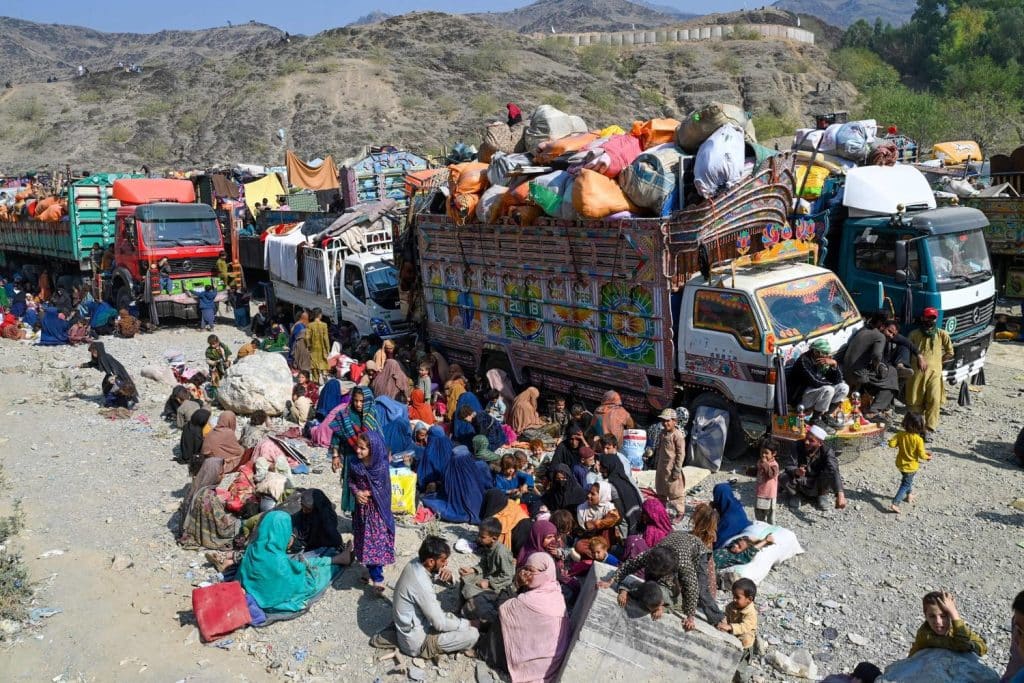Misunderstanding between two countries historic: Senator Saleem.
Migrants leaving Pakistan have right to take their properties: Dar.
Dilawar Khan calls for in-camera meeting on Afghan repatriation.
Amid the government’s crackdown to drive out all illegal migrants from the country, “anti-Pakistan sentiments” are being incited among Afghans in the neighbouring country, Senator Shehzad Saleem said while addressing the upper house of parliament on Monday.
The government last month decided to deport all the undocumented foreigners living in the country in light of a surge in terrorism in Pakistan. More than 280,000 Afghan nationals have left Pakistan since the new policy was announced, according to the United Nations High Commissioner For Refugees (UNHCR).
However, the senators demanded the repatriation of Afghans in a respectful manner during a Senate meeting today.
Saleem said that there has been a history of misunderstanding and mistrust between Islamabad and Kabul. He said that the country witnessed a spike in terrorist activities and authorities decided to send the illegal migrants back to their country to deal with the situation.
“An autonomous state is responsible for ensuring the safety of life and property of its citizens,” the senator said.
He, however, added that Pakistan has to play a role in regional affairs and promote political dialogue with Afghanistan as well.
‘Illegal migrants should be treated with dignity’
Senator Ishaq Dar while addressing the session said the refugees and migrants leaving Pakistan have the right to take their properties with them.
“If the [authorities] expel the foreigners, they should do it in a respectful manner,” Dar said, adding that the illegal migrants should be treated with dignity and respect.
He then referred to the government’s action to tackle rising terrorism after the Peshawar’s Army Public School attack in 2016.
“The aim was not to allow our soil for terrorism against anyone,” Dar said while recalling Operation Zarb-e-Azb and Operation Radul Fasad.
Meanwhile, Senator Tahir Bizenjo said that Khyber Pakhtunkhwa and Balochistan are the most affected regions if any change whether positive or negative takes place in Afghanistan.
He then also called for ensuring respectful repatriation of the Afghans.
“Hundreds of thousands of people cannot be sent back on such short notice,” Bizenjo said, adding that the deportation should be done in phases and with respect.
Moreover, Senator Maulana Abdul Ghafoor Haideri and Senator Manzoor Kakar also called for Afghan repatriation in a respectful manner.
Senator seeks mechanism to identify illegal migrants
Meanwhile, Senator Dilawar Khan called for an in-camera meeting to be convened by the government on the matter of Afghan migrants’ repatriation.
He also said that the government should devise a mechanism to identify the undocumented and unregistered Afghan citizens and show them the way back to their country in a civilised way.
Pakistan on Monday opened three new border crossings to accelerate the repatriation of undocumented Afghan nationals who have been ordered to leave the country or face expulsion, officials said.
Many Afghans have opted to go home voluntarily to avoid deportation under a government push for undocumented migrants to be expelled. Pakistan’s move affects more than 1 million Afghans, many of whom Islamabad says have been involved in militant attacks and crime, a claim Kabul rejects.
Pakistan has so far rejected calls from the United Nations, rights groups and Western embassies to reconsider its expulsion plan or to identify and protect Afghans who risk persecution at home.
Kabul has also asked Islamabad to give Afghan nationals ample time to leave.
The expulsion drive has driven relations between the neighbours to a new low, with Islamabad reiterating its claim that Islamist militants use Afghan soil to plan and carry out attacks in Pakistan. Kabul says Pakistan’s security is a domestic problem.
The mass migration has also raised fears of a humanitarian crisis as Kabul grapples with hundreds of thousands of people arriving and staying in makeshift tent villages on its side of the border at the onset of winter.

